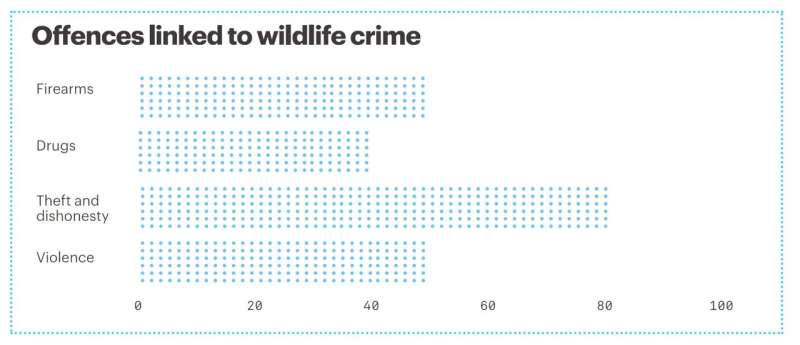This article has been reviewed according to Science X's editorial process and policies. Editors have highlighted the following attributes while ensuring the content's credibility:
fact-checked
trusted source
proofread
Report: Animals at risk as wildlife crime falls down the list of policing priorities

Despite being one of the highest value areas of crime globally, with links to organized and violent crime, wildlife crime is falling down the list of policing priorities due to lack of data, resource, and expertise, according to research led by Nottingham Trent University (NTU).
The study, commissioned by the International Fund for Animal Welfare (IFAW), examines the current state of wildlife crime in the UK and its enforcement. It forms the basis of a major new Make Wildlife Matter report and campaign from IFAW, which aims to galvanize the public, politicians, and organizations to press the government to better protect precious wildlife.
Wildlife crime—which increased by an estimated 30% between 2019 and 2021—is broadly defined as the illegal exploitation of wildlife species, including poaching, such as illegal hunting, fishing, killing, or capturing; abuse; and/or trafficking of wild animal species. Interpol and the United Nations Environment Program estimate that natural resources worth as much as USD 91 billion to USD 258 billion annually are being stolen by criminals.
Researchers from NTU and the University of Gloucester carried out surveys with police forces and Police and Crime Commissioners in both 2015 and 2022. They also conducted interviews with a range of Non-Governmental Organizations (NGOs) and academics with expertise in wildlife crime and wildlife law. In addition, the team analyzed literature on wildlife crime and wildlife law in the UK.
Findings showed that wildlife crime is not currently considered a core policing issue and is not given the same priority as 'mainstream' crimes. This is despite 100% of the wildlife crime officers questioned stating that wildlife offending was linked to other forms of serious crime, and 89% saying that wildlife crime should be given the same priority as more traditional types of crime.
Wildlife crimes were often seen as being victimless and therefore considered lesser offenses. It is suggested that this lack of a human victim leads to under reporting and a perception of less threat, harm, and risk.
In the UK, notifiable offenses are serious crimes that are reported to the Home Office by the Police for statistical purposes, and only a small amount of serious wildlife crimes are notifiable.
This was seen as an issue by all of the enforcement officers who completed questionnaires, as it means the lesser status in legislation impacts on the priority afforded to wildlife crime and its recording. This contributes to a lack of clear data on the level of wildlife crimes, as recording is inconsistent and varies by location, making it difficult to identify where priorities should lie.
The research also identifies wildlife crime as an under-resourced area that is heavily reliant on the dedication of individual officers and support from NGOs, such as the RSPB, RSPCA, and the League Against Cruel Sports. Cuts in policing budgets due to austerity measures are also impacting on the effectiveness of wildlife policing.
Participants raised concerns about the lack of available expertise in some areas, particularly when prosecutors with expert knowledge and experienced wildlife crime officers move to other roles with no guarantee that the specialist resource will be retained.
While the role of wildlife crime officer is recognized as an integral part of the policing response to wildlife crime, participants identified issues with training and the extent to which these officers are able to dedicate themselves to this enforcement given other demands.
Dr. Angus Nurse, research lead and Head of Criminology at NTU's School of Social Sciences, said, "It's clear that enforcement response is variable, indeed our Police and Crime Commissioner respondents indicated a clear belief that some police forces investigate and respond to wildlife crimes better than others.
"Our respondents pointed to some inconsistency in the understanding of wildlife crimes and wildlife and a greater need for training and resources to support effective investigation and prosecution. As a result, we found that effective wildlife crime enforcement is heavily dependent on the enthusiasm, dedication and specialist knowledge of individual officers and prosecutors rather than there being a clear, coordinated, effective permanent system in place across the UK."
Based on the research findings, the IFAW report calls for a number of changes to policy and law, including making wildlife crimes notifiable; harmonizing, simplifying, and streamlining all UK wildlife law; ensuring that there is at least one dedicated full-time wildlife crime officer per force; incorporating wildlife crime into the Policing Education Qualification Framework; and developing enforcement, prosecution, and sentencing guidelines to combat inconsistencies around wildlife crime scenarios and how those should be dealt with.
Frances Goodrum, Head of Campaigns, IFAW UK, said "Wildlife in the UK is already in crisis—being pushed to the brink through habitat loss, climate change and pollution. But these alarming findings show that criminals are purposefully going out of their way to harm or make profit from them."
"The fact that wildlife crime cannot be reported as a crime in a meaningful way means the government cannot measure or manage the current situation. Countless sinister crimes could be being committed—we simply do not know—it is all very 'finger in the air.' This must change—our wildlife deserves better."
More information: Report: Make Wildlife Matter
Provided by Nottingham Trent University




















